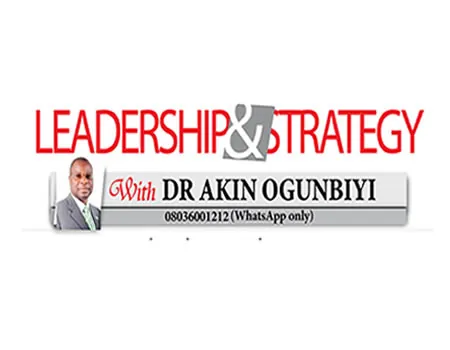Copyright tribuneonlineng

Intentional proactive choices, not reliance on legacy strengths and incremental solutions to disruption in today’s marketplace, will be my focus today. Let me start with this foundational question, why are some leaders despite their highly valuable skills, not confronting uncertainty, head-for-head, with innovative choices that will move their organisation’s forward in a sustainable manner? My answer is that they are comfortable with not making courage a choice. It is always easy to wish for progress, taking appropriate actions is the difficult part. For instance, applying “people stuff” skills to achieve motivation is very good. But in these challenging times, you must have hard conversations with yourselves as leaders and regularly with team members. You must also from time to time, obtain difficult feedback, otherwise stunted growth may be the result. It is a hard choice you must make. How many leaders can boldly say they are constantly on the move in their various organisations to constantly deliver impacts that will always be cherished. We are most times too ready to say that we are meeting and even surpassing agreed targets but, the question is, is every employee in your organisation regularly moving the needle of progress and success? Are we sincerely committed to innovative value narratives and needful disruptive actions? Are you fully accountable as a leader? Can you beat your chest and say the workforce is truly aligned to the all-important accountability culture of regularly delivering expected outcomes? Accountability is the readiness and capability to sincerely take ownership of decisions, actions and outcomes. It is that unwavering fundamental of shared commitment that produces shared success. Agreed overall talking point or opinion should be: “what is in it for us and not what is in it for me.” Every employee must be fully aligned with organizational goals. The cohesive workplace must have an unwavering commitment to always contributing their best. High degree of employee engagement is such that it must exude integrity, transparency, openness and feedback for growth. There must be mutual respect. No distrust and no indifference or carefree attitude to tasks. I have never stopped trumpeting accountability competency and its many advantages. We must build it among the leadership team and cultivate self accountability as critical fundamental of a thriving workplace. It will surely and continuously enhance as well as guarantee desirable performance. A workplace that seeks transformation for sustainable success must embark on the accountability culture shift by design. It is a critical tool for survival and progress in these challenging times. The leader or CEO must make this accountability culture shift happen immediately. Agile transformations must move beyond process change. Let us cultivate ownership and relevant empowerment as well as well-managed and carefully executed autonomy. Do not restrict accountability to punishment and promotion. Leaders and colleagues must take credit for what they do right and what they do wrong. We should “own” mistakes and gaps for necessary corrections. When you create stories to defend delays and give excuses as well as manipulative justifications, you are deliberately blocking leakages and shutting the doors against high performance. A leader that blames others and situations for poor performance inadvertently falls into a trap. He, without being fully conscious of it, gives up control. He is a powerless leader who negates progress and ethical values. Taking full responsibility and being accountable for decisions and actions, readily gives you useful insights. It creates new and additional ways to do things. You become more knowledgeable, garner useful experience and grow as well as broaden perspectives. Self accountability also ingrains the work ethics of discipline, commitment and dedication. It gives a fillip to professionalism and integrates overall efforts. Gaps in the accountability culture have debilitating effects on time, energy and money. Power or authority is context specific and context dependent. Leaders who are casual in their approach to self and overall accountability are non-achievers. Their actions most times, do not deliver desirable or expected impacts. When leaders get better, they make workplace efforts better. An essential pillar of accountability is effective communication. Leaders must communicate to effectively lead the team and promote accountability. The workforce must not pay lip service to accountability but be fully engaged in their responsibilities and tasks. Each team member must strive to be personally accountable in terms of his contribution to the business process and delivery of outcomes on a regular basis. The workplace must always ensure and foster focus on value-based productivity. Today, some organisations have introduced “daily balance sheet” to measure accountability of individual staff members especially their value contributions. We must promote values-based behaviours that are embedded in talent and learning processes. These behaviours must be reinforced daily through team practices. Let me conclude this write up with my thoughts on team cohesion, sustainable successes and prevention of pathological apathy. Motivation is critically linked to the brain. The workplace must encourage motivation to deliver positive and valuable human response. Leaders must actively listen to colleagues and respond to them with encouraging words. We should also prioritise appreciation and rewards. Courage to achieve fullness in accountability is the sure way to go in this era of disruptions.



